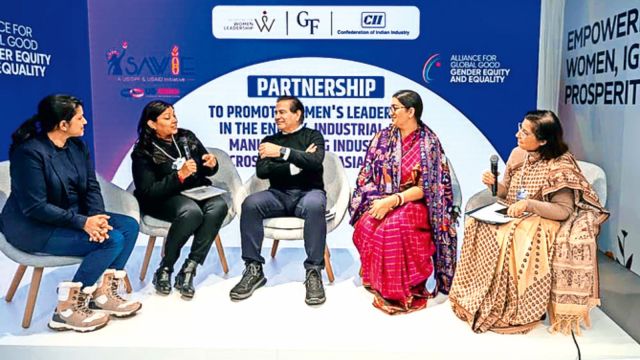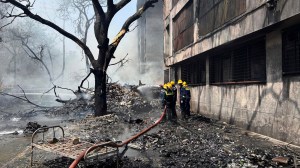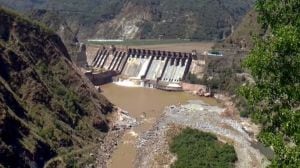From gender equity, biofuels, big cats, India taking lead at global high table
Irani discussed gender-responsive trade agreements with Singapore President Tharman Shanmugaratnam. At a meeting with philanthropist and Microsoft co-founder Bill Gates, the two explored collaborations on dismantling barriers in healthcare, digital skilling, and leadership.
 Former Union Minister Smriti Irani at the 2025 World Economic Forum in Davos. She is Chairperson of the Alliance for Global Good Gender Equity and Equality.
Former Union Minister Smriti Irani at the 2025 World Economic Forum in Davos. She is Chairperson of the Alliance for Global Good Gender Equity and Equality.At the World Economic Forum in Davos recently, former Union Minister Smriti Irani spoke about the business imperative of gender parity. At various meetings and seminars, she contended that gender equity is an economic necessity, capable of unlocking trillions in global GDP.
Smriti Irani is the Chairperson of the Alliance for Global Good Gender Equity and Equality launched in Davos last year.
Irani discussed gender-responsive trade agreements with Singapore President Tharman Shanmugaratnam. At a meeting with philanthropist and Microsoft co-founder Bill Gates, the two explored collaborations on dismantling barriers in healthcare, digital skilling, and leadership.
Supported by WEF, CII, Bill and Melinda Gates Foundation, and over 10,000 industry partners, the initiative — reflecting PM Narendra Modi’s agenda of women-led development — the initiative aims to foster global collaboration on women’s health, education and enterprise.
“In its first year, the Alliance, through CII Centre for Women Leadership and other on ground partners has united industry, governments, and civil society to drive transformative action, reaching out to over 12,000 industry members, engaging with more than 5,000 global delegates on issues around inclusion of women and launching skilling programmes that are reaching out to over a million women in India,” Irani tells The Indian Express.
At Davos 2025, they expanded the global footprint through two partnerships: Commonwealth Secretariat Partnership, focussing on empowering women and girls across 56 Commonwealth nations, including 21 countries from Africa and eight from Asia; and South Asia Women in Energy (SAWIE) Partnership, which seeks to enhance women’s leadership in South Asia.
Around the same time as Davos was being held, the International Big Cat Alliance (IBCA) — officially mooted by the Union government two years ago — was ratified as an international legal entity. From January 23, the IBCA and its New Delhi-based secretariat have become a full-fledged treaty based inter-governmental international organisation.
The IBCA was launched by Modi on April 9, 2023, during an event to commemorate 50 years of Project Tiger. Headquartered in India, its aim is conservation of seven big cats – tiger, lion, leopard, snow leopard, cheetah, jaguar and puma – with membership of all UN countries/the range countries harbouring the said species and non-range countries where historically these species are not found but interested to support big cat conservation.
As of now, 27 countries, including India, have consented to join IBCA and several international/national organisations working on wildlife conservation have also partnered with it. Four countries besides India — Nicaragua, Eswatini, Somalia and Liberia — have signed the Framework Agreement to formally become members of the IBCA.
Over the last few years, India has spearheaded several global initiatives, securing its key place at the international high table – including the International Solar Alliance (ISA), Global Biofuels Alliance (GBA), and the Coalition for Disaster Resilient Infrastructure (CDRI), besides IBCA.
Last year, an Indian delegation, headed by Principal Secretary to the PM, P K Mishra, participated in the G20 Disaster Risk Reduction Working Group Ministerial Meeting in Brazil. He highlighted India’s advancements in mitigating disaster risks, and showcased the PM’s global initiative, the CDRI, which now comprises 40 countries and seven international organisations.
The CDRI recently announced a $2.5 million fund to support cities to improve awareness, enhance planning, build financial resources, and integrate resilience into infrastructure operations to mark its 5th foundation day.
Cities in 30 low and middle-income countries, including India, will be eligible for funding under this programme.
The GBA was also launched by Modi along with leaders of the US, Brazil, Italy, Argentina, Singapore, Bangladesh, Mauritius and the UAE on September 9, 2023, on the sidelines of the G20 Summit in New Delhi, as Chair’s initiative.
GBA is a multi-stakeholder alliance of governments, international organisations and industries, bringing together the biggest consumers and producers of biofuels. Since its launch, GBA has garnered enormous support globally. Its current membership has expanded to 24 member countries and 12 International organisations. “The alliance has also enhanced its presence on global pedestal by representation at international forums such as COP28 (Dubai), World Economic Forum (Switzerland), India Energy Week 2024 and World Biogas Summit 2024 (UK),” said Suresh Gopi, Union MoS for Petroleum and Natural Gas.
The ISA is a global initiative launched in 2015 by India and France at the COP21 Paris summit to promote solar energy as a sustainable solution for energy access and climate change. Headquartered in India, the ISA is the first international organisation established in the country. With 120 member and signatory countries, the ISA now plays a key role in advancing global solar cooperation, supporting the transition to cleaner energy systems.
India, among other countries, has also proposed newer connectivity initiatives like the India Middle East Europe Economic Corridor — a proposed route from India to Europe through the UAE, Saudi Arabia, Israel and Greece. It is being recognised as a game-changer in building resilient supply chains once it is completed.








